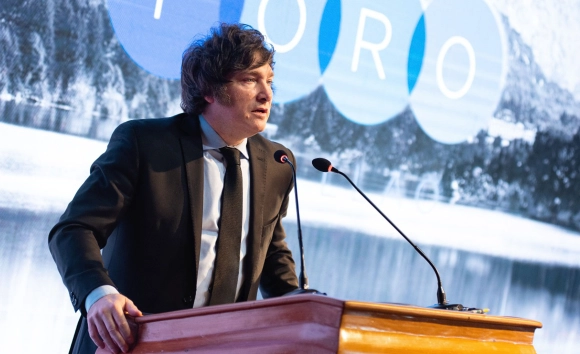The 28th Conference of the Parties (COP28) will take place in Dubai from November 28 to December 12. Chaired on this occasion by Sultan Al Jaber, who also holds the presidency of the ADNOC oil company, few are optimistic about the outcome of the summit. The exception is the oil sector, whose lobbyists far outnumber the delegates from several countries.
Two days before it is due to end, a new president will take office in Argentina who, like other far right-wing leaders, has denied climate change. If pre-election statements are anything to go by, it is clear that none of the leaders of La Libertad Avanza show any interest in environmental issues. We hear very strange proposals, such as fencing off the sea to preserve whales.
Although the signals emanating from the outgoing government were ambiguous, to say the least, if not contradictory, at least the executive acknowledged the problem. Such a contradiction is exemplified by the investment policy carried out by the public oil company (YPF) in the last years: while the company has decided to invest in some renewable projects, most of the funds are destined for non-renewable ones. Regarding the future, there are many uncertainties. Little is known about how the energy portfolio will be structured or what role the energy transition will play in public policies. Nor is it known what will be the attitude toward international commitments on climate and environmental issues, although, until recently, J. Milei was talking about withdrawing from the Paris Convention.
The oil sector has had a preponderant role in the design of the country’s energy policy, both during the government of M. Macri and under the mandate of A. Fernández. This relevance is maintained with the arrival of J. Milei, the so-called “president of the oil club”, who has appointed Horacio Marín, from the Techint group to the presidency of YPF. A new turn in the revolving door that characterizes the energy sector, once again the “change everything so that nothing changes”.
The world, meanwhile, is suffering the effects of an increasingly virulent climate crisis. Maintaining the “business as usual” scheme is not feasible while denoting zero social and environmental responsibility for businessmen. This has a cost that goes beyond the moral. On the eve of the next COP, the executive director of the International Energy Agency (IEA) states that the oil sector is truly facing a moment; its decisions, if erroneous, could be very costly. According to Fatih Birol, if they continue in this way, the industry will not be able to remove its responsibility for the problems that afflict humanity.
However, there is also room for optimism. When considering global climate finance data, a concept that encompasses both mitigation and adaptation investments, investments of more than $1.26 trillion were accounted for last biennium — up from $364 billion in 2011-12. Three aspects of the report are worth highlighting: on the one hand, most of the funds are invested in energy transition (mitigation) projects, ranging from new clean energy to electric vehicles. On the other hand, a significant portion of the funds originate in development banking. Regardless of the origin, it is also noteworthy that most of the loans granted go to finance local projects. It is this last aspect that stands out here: the energy transition has become a mainstay of the geopolitical race, where the main players are disputing technological supremacy for the energies of the future. Looking at the numbers in detail, more than 45% of the total investment is in Southeast Asia-Pacific. In terms of the industries of the green future, China has become the undisputed leader. The EU, which after Russia’s invasion of Ukraine has decided to accelerate the energy transition based on the REPowerEU program, comes second with investments of $325 billion. The US is just under 13% of the total amount, a lag that is undoubtedly explained by the climate denialism that this nation maintained during the presidency of D. Trump. This has changed following the approval of the inflation targeting package (IRA), a $391 billion package mostly earmarked for environmental action.
The warnings that emerge from the main energy experts, as well as the numbers described here, should make the new authorities think about the policies to be followed in energy matters. Regardless of the ambitions of some messianic leader, if we do not start with the transition, we will surely leave the country in worse conditions than the current ones. The market alone is incapable of guaranteeing the transition; political decisions and public policies are needed. According to IEA forecasts, the oil peak will come before the end of this decade. The scientific community tells us that the 1.5°C threshold is just around the corner.
Meanwhile, the president-elect persists in his denialism and in entrusting the oil sector with the design of the transition. If this is the case, Argentina may be left behind, stagnating with investments in a sector that faces strong financial risks. In 30 or 40 years, not only will these assets be stranded, but we will also have reinforced an energy matrix of the past. Deepening the fossil model also entails heavy fiscal costs in the present; as of September 2023, energy subsidies were around 8.4 billion dollars, an amount that includes benefits to companies and users and that is unsustainable. Another reason to move forward with the transition. Leaders from all over the world, from the West to the East, seem convinced of the seriousness of the climate problem; the insertion into tomorrow’s world involves accepting the challenge and working for the transition. More than looking like this or that country, those who govern us should think about how the climate emergency and the energy transition affect the country’s global insertion 30 or 40 years from now.
Translated from Spanish by Micaela Machado Rodrigues













